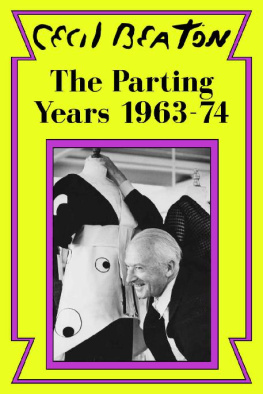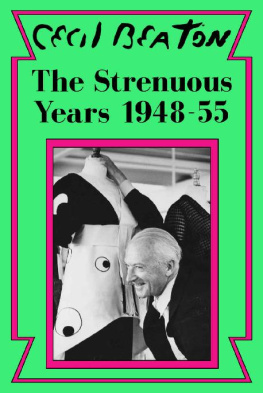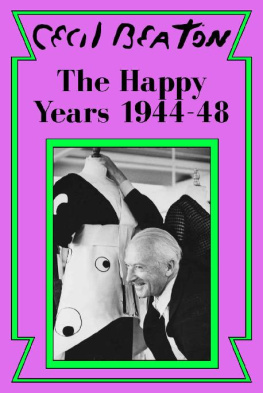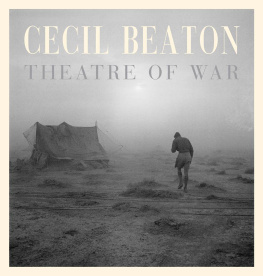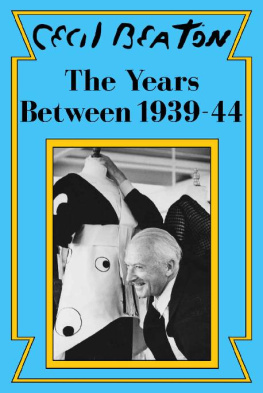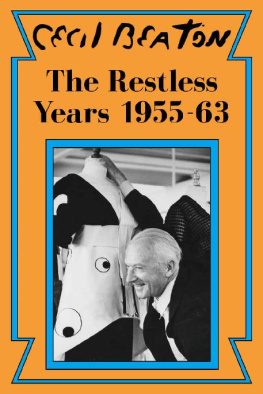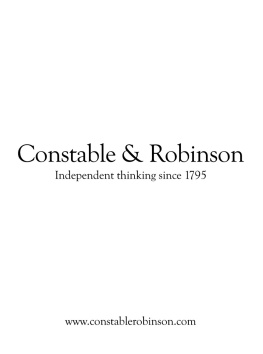Cecil Beaton - The Parting Years: 1963-74
Here you can read online Cecil Beaton - The Parting Years: 1963-74 full text of the book (entire story) in english for free. Download pdf and epub, get meaning, cover and reviews about this ebook. year: 2018, publisher: Sapere Books, genre: Non-fiction / History. Description of the work, (preface) as well as reviews are available. Best literature library LitArk.com created for fans of good reading and offers a wide selection of genres:
Romance novel
Science fiction
Adventure
Detective
Science
History
Home and family
Prose
Art
Politics
Computer
Non-fiction
Religion
Business
Children
Humor
Choose a favorite category and find really read worthwhile books. Enjoy immersion in the world of imagination, feel the emotions of the characters or learn something new for yourself, make an fascinating discovery.
- Book:The Parting Years: 1963-74
- Author:
- Publisher:Sapere Books
- Genre:
- Year:2018
- Rating:4 / 5
- Favourites:Add to favourites
- Your mark:
- 80
- 1
- 2
- 3
- 4
- 5
The Parting Years: 1963-74: summary, description and annotation
We offer to read an annotation, description, summary or preface (depends on what the author of the book "The Parting Years: 1963-74" wrote himself). If you haven't found the necessary information about the book — write in the comments, we will try to find it.
The Parting Years: 1963-74 — read online for free the complete book (whole text) full work
Below is the text of the book, divided by pages. System saving the place of the last page read, allows you to conveniently read the book "The Parting Years: 1963-74" online for free, without having to search again every time where you left off. Put a bookmark, and you can go to the page where you finished reading at any time.
Font size:
Interval:
Bookmark:
THE PARTING YEARS
1963-74
Cecil Beatons Diaries
Volume Six

Table of Contents
Foreword to the New Edition
I welcome the republication of the six volumes of Cecil Beatons diaries, which so delighted readers between 1961 and 1978. I dont know if Cecil himself re-read every word of his manuscript diaries when selecting entries, but I suspect he probably did over a period of time. Some of the handwritten diaries were marked with the bits he wanted transcribed and when it came to the extracts about Greta Garbo, some of the pages were sellotaped closed. Even today, in the library of St Johns College, Cambridge, some of the original diaries are closed from public examination, though to be honest, most of the contents are now out in the open.
The only other person who has read all the manuscript diaries is me. It took me a long time to get through them, partly because his handwriting was so hard to read. I found that if I read one book a day, I had not done enough. If I did two in a day, then I ended up with a splitting headache! This in no way deflected from the enormous enjoyment in reading them.
Altogether there are 145 original manuscript diaries dating from Cecil going up to Cambridge in 1922 until he suffered a serious stroke in 1974. A few fragments of an earlier Harrow diary survive, and there is a final volume between 1978 and 1980, written in his left hand. 56 of these cover his time at Cambridge, some of which appear in The Wandering Years (1961) . 22 books cover the war years, and were used for The Years Between (1965), and nine books record his My Fair Lady experiences, some of which appear in The Restless Years (1976) and were the basis for Cecil Beatons Fair Lady (1964). These six volumes probably represent about ten per cent of what Cecil Beaton actually wrote.
The diaries attracted a great deal of attention when first published. James Pope-Hennessy wrote of Cecils thirst for self-revelation, adding that the unpublished volumes were surely the chronicle of our age. Referring to Cecils diaries, and those of Eddy Sackville-West, he also commented: We could not be hoisted to posterity on two spikier spikes.
I have to tell the reader that these volumes were not always quite the same as the originals. Some extracts were rewritten with hindsight, some entries kaleidoscoped and so forth. Certain extracts in these six volumes were slightly retouched in places, in order that Cecil could present his world to the reader exactly as he wished it presented. And none the worse for that.
Hugo Vickers
January 2018
Part I: Home and Away, 1963-4
RETURN TO AN OLD HAUNT
London: December 1963
Visited D. Bryce Smiths artists materials shop in the Hampstead Road, a haunt of my extreme youth. This Euston neighbourhood, once flourishing, in a small Dickensian way, is now in the throes of a huge reconstruction; there are to be overpasses, underpasses, garages and skyscrapers. Meanwhile, little derelict shops are to be pulled down. My old Aladdins Cave of hot-pressed and rice-paper notebooks still survives, with a lease of ten years to go, but all around is decay. Shades of Eggie Hine at Harrow, my first Diaghilev ballet sketches, and Pavlova drawn on rice-leaf pages. This is where I used to come to get the tools of my trade.
It was depressing to come back. So much was no longer available. Coxs rough paper gone; so much that was of quality now superseded. An arty-genteel lady served me in an almost deserted shop in which a few slipshod, makeshift partitions were hiding the living quarters backstage. There were heavy layers of dust on old notebooks on shelves and, on the counter, hideous, garish calendars and gimmicky, trashy gadgets. The arty lady saw I wanted a lot of things but was easily diverted to gossip over the telephone when it rang.
I kept ordering in vast quantities, inspired by the thought that there was much to design in the near future ( Traviata , Arabella , the Lerner musical about Chanel). I was refusing to be daunted by the unhelpfulness of the arty lady, or by the difficulty of getting what I really wanted.
I went out hopefully with papers and notebooks under my arm, but hardly with the elation in my heart that I had had when I was twenty.
December 11th, 1963
Exercises at eight oclock were quite an effort with a hangover. Decided to give up work for the day. Lunch with Patrick Plunket. Highly sophisticated fish food at Wiltons, served as in a nursery. Jokes, high spirits, followed by tour to Bond Street; strange frantic shoppers; on to crowded David Hockney exhibition. He is undoubtedly an original, and his engravings for Rakes Progress are beautiful. This Manchester boy with the yellow glasses, yellow dyed hair and exaggerated north-country accent was accosted at vernissage by an irate lady. In a loud voice she challenged him for drawing his nude women in such a distorted manner. Can you really imagine that is the way the arm comes out of the socket? Look at their bosoms theyre nowhere near where they should be. Have you ever seen a naked woman? A dornt knogh ars ah harve! Well, Ill tell you the hips are not like that; the entrejamb starts here, not there. The thighs arent flat like that, the buttocks arent small and squashed and sideways. Dont you realize that the rib cage runs down to the groin? A dornt knogh ars ahm unturusted!
Highly civilized evening with Bertie Abdy. He formed collections for Chester Beatty and for Gulbenkian, and had close connections with Wildenstein. When he bought a Renoir for five thousand francs he was called a milord - imbcile in the French press for doing so. He had the first exhibition of Paul Klee, and although the highest price was 14 he did not sell one. An art connoisseur par excellence , but who must make money, he has now fallen on better days, comparatively.
Jane Abdy in black organza from Dior. Best Rothschild wine and food. Felt utterly at ease, loving every rare moment of Berties fascinating stories of the dishonesty of art dealers. Of course Bertie always does the best for himself, and has the whole world of art dealers against him. But they know he has an eye and knowledge, and they are terrified of him.
Fascinating conversation with Edwina dErlanger who relishes the luxurious nuances of clocks and Chinese china. Edwina added her experience of nearly being swindled out of 10,000 over a pair of pearl earrings.
December 19th
Brando Brandolini and Cristiana were being entertained at the David Somersets, so not only did I throw myself joyously into the atmosphere of cigar smoke and Dom Perignon gaiety, but after two hours went on to a young beatnik party given by Lucy Lambton for Michael Wishart.
Reddish: December 21st
Crichel came to lunch. The boys are all elderly men now. Eddie, a lord, cannot and need not work. His taxes make it simpler not to earn. Desmond Shawe-Taylor exploded with rage when I asked if hed approve of a Traviata country scene taking place in a stable. You cant write notes in a stable shes got to have a desk. His eyes shot red flames. I felt unable to concentrate upon Trevor-Ropers diagnosis of imaginary or non-imaginary pains as I was too busy clearing the table, and with the dining-room reverberating more than I realized, I found myself hard of hearing and sadly missed a lot of the conversation on the subject of Stephen Tennants eccentricity and young Julian Jebbs longing to make the pilgrimage to his house at Wilsford.
An afternoon walk started aimlessly but gained impetus. It was such a cold afternoon that we had to be brisk. A round, rose-coloured sun was fast sinking, the rolling hills in the distance sweet-pea coloured, the ground beneath one hard as crystal. The pigs were eating the wooden stanchions of their sties. The calves very somnolent; the birds, few left behind, flying off straight to the horizon. Walked over crusty, ploughed fields, over the hill above Broadchalke, then down the avenue of elms where I exerted myself, doing a Queen Mary, pulling the ivy off the trunks, a miniscule contribution but utterly absorbing. Glowing with health I returned to the village where the local children were coming out of the hall having seen Treasure Island . I went to the church to look at the chair given in memory of my mother, but found the door locked.
Font size:
Interval:
Bookmark:
Similar books «The Parting Years: 1963-74»
Look at similar books to The Parting Years: 1963-74. We have selected literature similar in name and meaning in the hope of providing readers with more options to find new, interesting, not yet read works.
Discussion, reviews of the book The Parting Years: 1963-74 and just readers' own opinions. Leave your comments, write what you think about the work, its meaning or the main characters. Specify what exactly you liked and what you didn't like, and why you think so.

